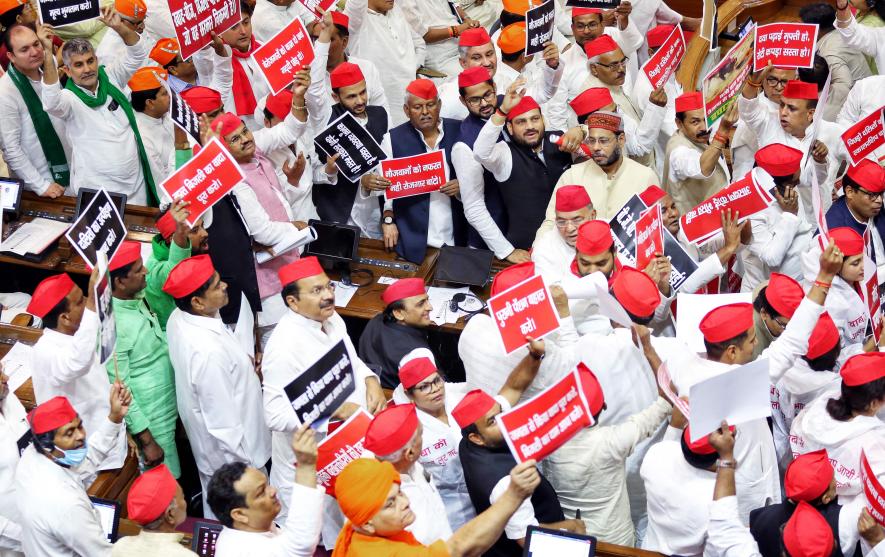Samajwadi Party Needs an Urgent Revamp

Representational use only.Image Courtesy: ANI
The Samajwadi Party (SP) is struggling for its existence after facing four successive defeats in the electoral battle. It is high time for the party to oversee its strategy, overhaul the organisational structure, and explore new alliances.
Despite giving a tough fight to the Bharatiya Janata Party (BJP), Akhilesh Yadav, the SP president, bagged only 111 seats in an assembly of 403 seats in the 2022 assembly elections. This was the fourth successive defeat of the SP against the BJP. This was the fourth defeat for the party since 2014.
In 2012, the SP formed the government in Uttar Pradesh under the chief ministership of Akhilesh Yadav on its own with 224 seats. The alliance between Other Backward Castes (OBCs) crafted by Mulayam Singh Yadav, the SP founder, played a key role in the success of the SP.
This was the first time since its formation in 1992 that the SP formed a government on its own. But after the entry of Narendra Modi into national politics, the caste arithmetic lost its sheen against the BJP.
As the Non-Yadav OBCs jumped out of the SP ship into the BJP’s fold, the SP graph dropped from 23 members of parliament to 05 MPs.
Akhilesh took the reins of the SP in his hands from his father, Mulayam Singh Yadav, in 2016-17. He made alliances with the Congress in the 2017 Assembly elections and with the Bahujan Samaj Party in the 2019 general elections but did not achieve any victory.
In the Assembly election of 2017, the SP contested 311 seats and won only 47 seats, while in the 2019 general elections, it again won 05 seats as in 2014. However, the SP vote percentage fell from 3.4% in 2014 to 2.6% in 2019.
The SP president avoided alliances with big parties in the 2022 assembly elections, and to consolidate the OBCs’ votes, Akhilesh allied with small caste-based parties like Rashtriya Lok Dal (RLD) and Suheldev Bhartiya Samaj Party.
The alliance gave a tough contest to the BJP-led National Democratic Alliance (NDA). The SP contested 347 seats and won 111 seats. The SP’s vote percentage also increased from 21.82% in 2017 to 32.06% in 2022.
The Muslim community, which comprises nearly 20% of the state’s population, overwhelmingly voted for SP. But the alliance failed to attract the OBCs into its fold.
Many believe that Akhilesh’s minimal presence on the grounds created disillusionment against the party among the OBCs. Muslims are also aggrieved with the SP as the party president did not take any stand on atrocities against them. The community has been targeted in the name of cow slaughter, love jihad, etc., since the Hindu-nationalist Narendra Modi came into power at the centre in 2014.
Hate crimes against Muslims and their lynching are also rising. Many Muslims have been incarcerated in UP for a long time, and many of their houses have been demolished. But Akhilesh seldom spoke for them.
The SP president neither led a protest against inflation nor spoke out against the rising unemployment graph. Evidently, his silence on issues of youth issues and the question of social justice created disgruntlement for the party among them.
Even Akhilesh did not visit Rampur and Azamgarh in the recently concluded by-elections. As a result, the SP lost its bastion to the BJP. Earlier, Akhilesh and Azam Khan were lawmakers from Azamgarh and Rampur.
Political thinkers opined that Akhilesh’s absence from the ground weakened his party. Professor Ravi Kant Chandan of Lucknow University says, “It is palpable that Akhilehs’s reluctance to work on the ground made the unsustainable.”
“The party needs overhauling at the organisational level,” he added. It is to be mentioned here that no Muslim face was among the party's top brass, and Dalits’ presence in SP’s organisation was also dismal. According to Chandan, a massive movement for a “caste census” may revive the party.
Another senior political analyst believes that only a mobilisation of OBCs could break the juggernaut of the BJP’s hardline Hindutva. While talking about the SP’s future in electoral politics, Atul Chandra, the former editor of the Times of India, says, “Akhilesh’s party has ample support among the Muslims, but to retain it till 2024 is challengeable without giving them representation in the party and standing with them at the forefront.”
Although Chandra believes that merely Muslim support is not enough to revive the party until the party’s top brass participates in or launches a mass movement on issues like reservation, unemployment, inflation, etc.
Meanwhile, after the debacle of Rampur and Azamgarh, Akhilesh Yadav dissolved all the party units. In search of new faces, the party started a membership drive. However, the picture of the party’s future strategy remains hazy.
Get the latest reports & analysis with people's perspective on Protests, movements & deep analytical videos, discussions of the current affairs in your Telegram app. Subscribe to NewsClick's Telegram channel & get Real-Time updates on stories, as they get published on our website.
























